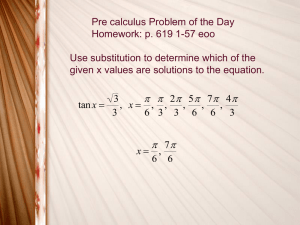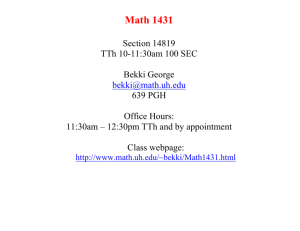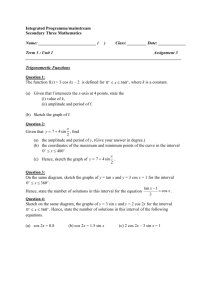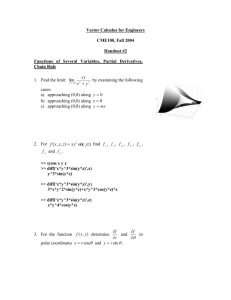day19c
advertisement
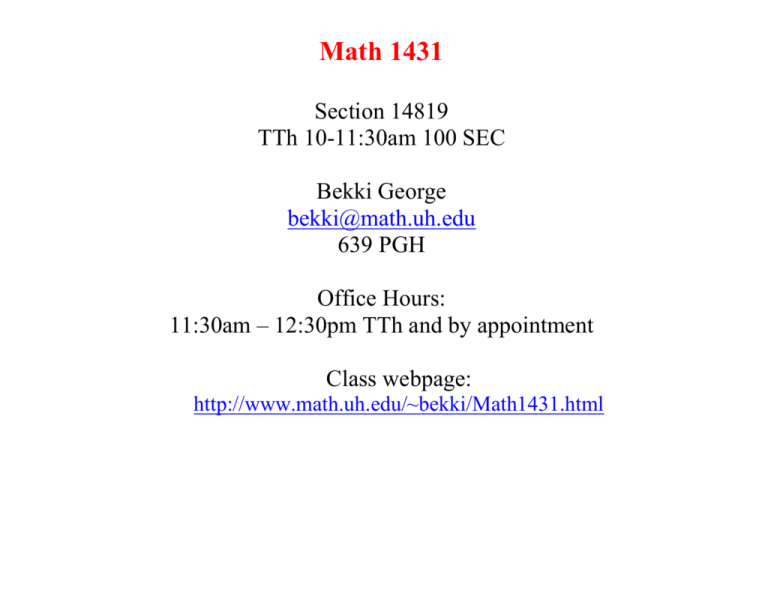
Math 1431 Section 14819 TTh 10-11:30am 100 SEC Bekki George bekki@math.uh.edu 639 PGH Office Hours: 11:30am – 12:30pm TTh and by appointment Class webpage: http://www.math.uh.edu/~bekki/Math1431.html Find the derivative of a log function with base a. lnx log a x = Use change of base formula: lna y = log a x y = log a u Find the derivative of each. y=2 x y=5 3x 2 ln ( cos x ) y= 2 y = log ( cos x ) y = log 5 ( tan x ) y= ( ( x + 3) x 4 + 12 ) 4 x2 + 5 y = (3x 4 + 2x)(cosx ) Inverse Trigonometric Functions f (x) = sin x on the interval [–10, 10] Is this an invertible function? f (x) = tan x on the interval [–6, 6] Is this an invertible function? Restricted versions of these functions. f (x) = sin x on , 2 2 These ARE invertible functions. f (x) = tan x on , 2 2 Let f (x) = sin (x) for x , . This function is invertible and 2 2 we denote its inverse by sin 1 x or arcsin x . sin (x) on , 2 2 arcsin x on [–1, 1] Let f (x) =tan (x) for x , . This function is invertible and 2 2 we denote its inverse by tan 1 x or arctan x . tan (x) on , 2 2 arctan (x) on (–, ) Function Domain Range From PreCalculus: sin sin sin 3 6 4 2 sin 3 4 sin 3 sin sin sin sin sin 1 1 1 1 1 3 2 1 2 1 2 3 2 3 2 If y = arcsin x a) find sin y b) find cos y c) find y’ Popper15 A 1. In the given right triangle, BC = x B A. x 2 -1 B. 1- x 2 C. x 2 +1 D. x +1 E. none of these 1 C 2. sin 1 sin π 6 A. 1/2 B. 3/2 C. p / 6 D. p / 3 E. none of these 3. A y = arcsin x find cos y y arc sec 5 find tan y 2 si n arc sec x cos 2 arcsin 3 5 sin 2 arccos 4 5 f (x) = y = arctan x f (x) = y = arcsec x find y’ find y’ Formulas (u is a function of x): d é arcsinu ù = û dx ë u' 2 1-u d é arcta nu ù = u' û 2 dx ë 1+u d é arc sec u ù = û dx ë u' 2 u u -1 Give the domain of f x arctan ln x and compute its derivative. x Give the domain of g x arcsin e and find the equation for the 2 tangent line to the graph of this function at x = 0. Differentiate: y tan 1 x Differentiate: f x e tan 1 x Differentiate: y = sin -1 2 x +2 Popper15: 4. The graph of y = f ' (x) is shown below. Give the smallest value of x where the graph has a point of inflection. a) 3.5 b) -2 c) -3.5 d) 2 e) 0 5-11. Given the graph of f ‘(x) below, determine where f is increasing, decreasing, intervals of concave up and concave down. List all local maximum and minimums and points of inflection. 5. Interval(s) of increase: a. (-2,-1)È(2,¥) b. (-¥,-2)È (-1,2) c. (-¥,0)È (3,¥) d. (0, 3) e. none of these 6. Interval(s) of decrease: a. b. c. d. e. (-2,-1)È(2,¥) (-¥,-2)È (-1,2) (-¥,0)È (3,¥) (0, 3) none of these 7. Interval(s) of concave up: a. b. c. d. e. (-2,-1)È(2,¥) (-¥,-2)È (-1,2) (-¥,0)È (3,¥) (0, 3) none of these 8. Interval(s) of concave down: a. b. c. d. e. (-2,-1)È(2,¥) (-¥,-2)È (-1,2) (-¥,0)È (3,¥) (0, 3) none of these 9. Local maximum: a. b. c. d. e. (-1, f (-1)) (0, f (0)) (3, f (3)) (-2, f (-2)) (2, f (2)) Local minimum: 10. a. b. c. d. e. (-1, f (-1)) (0, f (0)) (3, f (3)) (-2, f (-2)) (2, f (2)) 11. Points of inflection: a. (-1, f (-1)) b. (-2, f (-2)) c. (2, f (2)) d. all of these e. none of these
